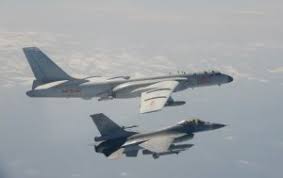China announced on Monday that it would continue its provocative military exercises near Taiwan, which have seriously heightened concerns about the possibility of conflict in a critical trade-dependent region by disrupting air and sea travel.
According to social media posts from the eastern command of the People’s Liberation Army, the military wing of China’s ruling Communist Party, the exercises would include anti-submarine maneuvers that appear to target American backing for Taiwan in the case of a future Chinese invasion.
The U.S. House Speaker Nancy Pelosi’s visit to the self-governing island last week, according to the military, prompted the exercises involving missile attacks, warplane movements, and ship movements over the Taiwan Strait’s midline.
There have been calls for China to de-escalate the situation, and there has been no indication of when it will lift what amounts to an embargo.
China will “firmly safeguard China’s sovereignty and territorial integrity, resolutely deter the U.S. from containing China with the Taiwan issue and resolutely shatter the Taiwan authorities’ illusion of “relying on the U.S. for independence,” according to Wang Wenbin, a spokesperson for the Chinese Foreign Ministry.
The naval and aviation exercises were being conducted by a total of 66 aircraft and 14 warships, according to Taiwan’s defense ministry on Sunday. In response, the island has activated its military, sent ships, planes, and other resources, and is keeping an eye on Chinese drones, aircraft, and ships that are “simulating strikes on the island of Taiwan and our ships at sea.”
In retaliation to the Chinese preparations, the Taiwanese army will conduct live-fire artillery drills in southern Pingtung County on Tuesday and Thursday according to the official Central News Agency of Taiwan.
According to the article, which cited an unnamed source, the drills will involve snipers, combat vehicles, armored vehicles, as well as assault helicopters.
China has threatened to conquer Taiwan by force if necessary and claims Taiwan as its own territory. After a civil war, the two sides divided, yet Beijing views international dignitaries visiting Taiwan as an acknowledgment of its sovereignty.
The international community has been urged to “defend democratic Taiwan” and “prevent any escalation of the regional security situation,” according to Taiwan President Tsai Ing-wen. China’s activities have drawn criticism from the Group of Seven industrialized nations, which led Beijing to postpone a meeting between Wang Yi, the foreign minister, and Yoshimasa Hayashi, the foreign minister of Japan.
In retribution for Pelosi’s visit, China has halted defense and climate negotiations with the United States and slapped sanctions on her.
The “one-China” policy, which extends official diplomatic recognition to Beijing while allowing strong informal connections and defense links with Taipei, is maintained, according to the Biden administration and Pelosi.
However, the U.S. chastised Beijing for its actions in the Taiwan Strait, labeling them “fundamentally irresponsible” by White House press secretary Karine Jean-Pierre.
This escalated situation “has no justification or need,” declared Jean-Pierre.
Taiwan’s de facto ambassador to the United States, Bi-khim Hsiao, stated in Washington that China had no need to “be so unhappy” over Pelosi’s visit, which continues a long tradition of American legislators visiting Taiwan.
Hsiao said to CBS News on Sunday, “Well, you know, we have been living under the threat from China for decades.” “You don’t claim you don’t go to school if your child is being tormented at school. You look for a way to handle the bully.
Beijing is the source of the risks, claimed Hsiao.
Chinese Foreign Minister Wang Yi said Washington was “taking the opportunity to build up its military deployment in the region, which deserves high vigilance and a resolute boycott from all sides” while visiting Myanmar, whose Chinese-backed military government has been accused of killing its opponents.
Wang was quoted by the official Xinhua News Agency as saying that “China’s hard position” is intended to “earnestly defend peace across the Taiwan Strait and regional stability.”
Australian Foreign Minister Penny Wong urged for a lowering of the tensions in the meanwhile. The entire region is concerned about the current situation and is appealing for stability to be restored, Wong told reporters in Canberra. “Australia continues to urge moderation and de-escalation, but this is not something that Australia is simply pushing for.”

















